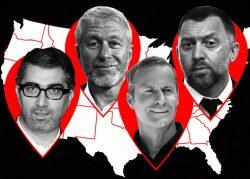Billionaire Andrey Blokh bought an oceanfront unit at the newly completed Estates at Acqualina in Sunny Isles Beach.
Blokh, a Russian-American cannabis investor who is the second-biggest shareholder of Curaleaf, and his wife, Marina Mikhailovna, paid $5.9 million for unit 1103 in the south tower of Estates, at 17909 Collins Avenue, according to property records. Blokh and Curaleaf founder Boris Jordan, a fellow Russian-American billionaire, are said to have built Curaleaf together, Forbes reported.
Sunny Isles is also known as “Little Moscow” because of its large Russian population. Blokh’s condo is part of the 154-unit, 49-story oceanfront tower that was completed this summer. An affiliate of the Trump Group is developing the two-tower project, which features Karl Lagerfeld-designed lobbies and a 45,000-square-foot amenities villa. More than 110 closings have been recorded to date.
Blokh’s billionaire status has fluctuated. Last year, Forbes pegged his net worth at $1.9 billion, but reported in March that his fortune, which included about 20 percent of Curaleaf’s stock, had fallen to under $1 billion. Blokh made his money while he was president of Sibneft, a Russian oil company that Roman Abramovich owned.
Read more



Estates at Acqualina is the third luxury development for Jules and Eddie Trump (no relation to the former president) in Sunny Isles Beach. Prices for units ranged from about $4 million to $35 million for the penthouse. Estates at Acqualina also includes three single-family homes. The amenities building will include an ice skating rink, bowling alley and the Avra Miami Estiatorio restaurant.
Other buyers include South African wine mogul Lance Ellman, and his wife, Caryn; Ferraro Foods owner Michael Giammarino; Avra Group co-owner Nick Tsoulos; and luxury broker Ryan Mendell.
The Trump Group revealed initial plans for the two-tower complex in 2015, and construction began in 2018. It launched sales of the second tower more than two years ago.
The developer and its general contractor sued each other over issues tied to project delays and allegedly unpaid work, but the lawsuits were both settled earlier this year.
